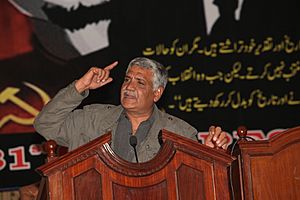Lal Khan facts for kids
Quick facts for kids
Lal Khan
|
|
|---|---|
| Born |
Tanveer Gondal
1956 Bhaun, Punjab, Pakistan
|
| Died | 21 February 2020 (aged 63) |
| Nationality | Pakistani |
| Alma mater | Nishtar Medical College Vrije Universiteit Amsterdam |
| Occupation | Political theorist, activist, writer |
| Organization | The Struggle Pakistan |
|
Notable work
|
Pakistan's Other Story; The 1968-9 Revolution |
Lal Khan (Urdu: لال خان; June 1956 – 21 February 2020) was a well-known political activist and writer from Pakistan. He believed in Marxism, which is a way of thinking about society, economics, and politics that focuses on how different social classes interact.
His birth name was Tanveer Gondal. He trained as a doctor but later stopped practicing medicine. He wanted to spend all his time working for political change. Lal Khan became the leader of a Pakistani group called The Struggle. He was also the editor of their newspaper and wrote articles for other newspapers like Daily Times and Dunya. He passed away on February 21, 2020, after being sick with cancer for over a year.
Contents
Early Life and Activism
Lal Khan started his journey as a student and activist in the 1970s. At that time, a military leader named General Zia ul Haq took control of Pakistan. This change in government led to many political activists being arrested.
Lal Khan was put in prison for a year. After his release, he went to university in Islamabad, Pakistan's capital city. In 1980, he moved to the Netherlands to avoid further trouble. He feared he might face a death sentence in Pakistan. While living in the Netherlands, he studied at the Vrije Universiteit in Amsterdam. He stayed there for eight years. In 1988, he returned to Pakistan. He decided to stop being a doctor and focus completely on political work.
Working for Change
Lal Khan was a key leader of The Struggle. This group follows the ideas of thinkers like Marx and Lenin. They believe in changing Pakistan's society and economy. They wanted the government to control major industries. They also wanted workers to have a say in how these industries were run.
The group also worked to end religious extremism. They wanted to get rid of unemployment and make sure everyone in Pakistan could get free education. Lal Khan was also the editor of the Asian Marxist Review. He was the International Secretary of the Pakistan Trade Union Defence Campaign.
Views on India and Pakistan
Lal Khan believed that the partition of India (when India and Pakistan became separate countries) caused many problems. He thought that if India and Pakistan reunited, it could solve issues like the Kashmir conflict. He felt that the shared history and culture of the region were very strong.
He wrote about these ideas in his book, "Crisis in the Indian Subcontinent, Partition: Can it be Undone?". He argued that big changes in the economies and societies of both countries were needed for reunification. He imagined a voluntary union where different groups would come together. He believed that ending poverty and exploitation was only possible by changing the current economic system.
Later Activities
In March 2011, The Struggle held its largest meeting in Lahore. These yearly meetings help the group review their work. They also plan new ways to bring about social change.
In 2013, Lal Khan spoke about Malala Yousafzai. He felt that some of her supporters in the West were not fully representing her. He believed they were hiding her background as someone who supported socialist ideas.
In 2016, Lal Khan made a joint statement with Mohammed Yousuf Tarigami. Tarigami was a leader from the CPI(M) in Jammu and Kashmir. They called for workers in India and Pakistan to unite. They believed this unity could help solve the Kashmir conflict. They also thought it could lead to changes in the economic system of the subcontinent.
Death
Lal Khan passed away on February 21, 2020. He had been battling cancer for more than a year. He died at a hospital in Lahore.
See also
- Trotskyism
- International Marxist Tendency
- Ted Grant
- Alan Woods


